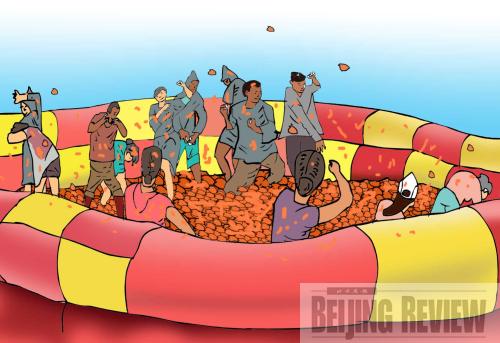|
 |
|
(LI SHIGONG) |
In order to celebrate its second anniversary, a shopping center in Guiyang, capital of southwest China’s Guizhou Province, organized a tomato fight on July 20. The idea was based on the famed tomato festival in Spain. Guiyang’s event attracted almost 1,000 people who engaged in a pitched fight using close to 25 tons of tomatoes, with a total cost of 100,000 yuan ($14,700).
This is not the first time tomato fights have been seen in China. In October 2008, a theme park in central China’s Hunan Province held a several-day-long tomato fight, which was followed by a similar fight in Dongguan, south China’s Guangdong Province. And it is not only tomatoes that are hurled about, as persimmon and grape fights have also been staged. Almost all these events have drawn criticism.
Opponents say that as China has a growing population and decreasing area of arable land, the country is just not wealthy enough to have the luxury of such entertainment. Even those who do have money should use it in a way that can help others in need.
Nevertheless, some people believe that sponsoring businesses purchased these tomatoes from farmers, so farmers still benefit from tomato fights. Besides, they say, since the use of so many tomatoes for commercial purposes has not led to short supplies in the market, the events should not be criticized for alleged food waste.
Some believe that in the process of globalization, taking after festivals and carnivals of other countries is normal. If a tomato fight can bring joy to participants and help local tourism, why not have it? Those who oppose Western festivals are actually lacking self-confidence and they are afraid they will be assimilated by Western culture, says this group.
Don’t waste
Chen Yiquan (www.sznews.com): There is a famous saying in China, “People see food as their main requirement,” which indicates the holiness of food. Then why is the tomato, which is a kind of popular food, becoming the victim of “mass fights?” The reason is simple: Some people have irrationally prioritized entertainment over anything else. As a result, the sellers do not care about whether a certain commodity, food included, will be used correctly, but they are only interested in how much profit they can make. This is the same case with buyers. What they care about is whether a certain commodity can make them happy.
It’s great to promote a place or a business by organizing an interesting event, but never should it be based on the waste of food. This is an unreasonable practice that will inflict a negative impact on social values. Suppose people lose interest in tomato fights, then what food will be the next choice? Will they choose to throw rice into the river if this will bring joy?
The tomato fights are really fights between conventional and distorted values!
Qin Jianzhong (www.bokerb.com): Some people may argue that, since similar fruit fights are frequently held in Western countries, why can’t Chinese play this game? The reason is simple: The national condition of China is different from that of Western countries.
We are glad that China’s aggregate gross domestic product (GDP) will soon overtake Japan as the world’s second largest, but we have to admit that China’s per-capita GDP ranks behind 100 countries in the world. Moreover, China’s social and economic development is uneven. In Guizhou, where the latest tomato fight was held, impoverished villages are scattered all over the province.
In Chinese history, there is a famous story. Once upon a time, there lived a beautiful maiden, Xishi. Her beauty was peerless. But heartache caused her great pain. So much so that she held her hand to her chest and furrowed her brow when she walked. An unattractive woman who lived in the neighborhood saw Xishi walking in the village street one day with her hand on her chest and furrowed brow. She was so in awe of Xishi that she decided to imitate Xishi’s walk, not realizing that this only made her look even more unattractive.
For thousands of years, people have been repeating the mistake of slavishly imitating what is unsuitable for them, with the tomato fight in Guiyang being a prime example. For many people, tomatoes are still not cheap. Although the tomato fight participants have the right to entertainment, what makes them happy is actually making others sad.
Yi Qiyang (Ningbo Daily): Despite the many favorable reasons for tomato fights, that it is an innovative form of entertainment and that it will help to change Chinese people’s excessively cautious cultural character, I’m strongly opposed to it.
Indeed, tomatoes are not precious food. However, if you think you can throw away anything you want as long as you can afford it, then you are wrong. Worse still, once ordinary people begin to think this way, everyone will waste the things they can afford.
| 